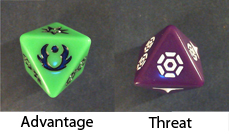My problem with the talent is not that it gives the player narrative control of a "Device" but that it uses the mechanic skill.
Giving the players narrative control is all well and good. Heck the less "story " I need to pull out of my backside the better. But the fact that it is dependent on the skill of the player is distasteful to me.
That it requires a skill role, makes me think it should require the character interact with the "device" in order to cause it to fail.
If it is simply a bad turn of fate that causes the device to fail, then why does it depend on the skill of the mechanic? Should it not be a Destiny point flip?
Edited by Ryoden
